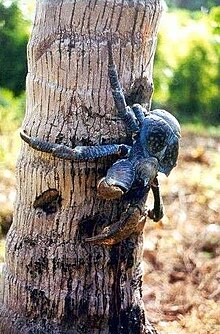椰子蟹
椰子蟹(学名:Birgus latro)又称八卦蟹,属于陆寄居蟹科,是一种十足目的节肢动物[2],它是世界上最大的陆生节肢动物,也是现存最大型的陆生甲壳纲。它分布在印度洋、太平洋的岛屿,从甘比尔群岛、皮特肯群岛直至桑给巴尔海岸。
| 椰子蟹 | |
|---|---|

| |
| 科学分类 | |
| 界: | 动物界 Animalia |
| 门: | 节肢动物门 Arthropoda |
| 亚门: | 甲壳亚门 Crustacea |
| 纲: | 软甲纲 Malacostraca |
| 目: | 十足目 Decapoda |
| 亚目: | 腹胚亚目 Pleocyemata |
| 科: | 陆寄居蟹科 Coenobitidae |
| 属: | 椰子蟹属 Birgus Leach, 1816 |
| 种: | 椰子蟹 B. latro
|
| 二名法 | |
| Birgus latro Linnaeus,1767
| |

| |
| 椰子蟹分布地区 | |
椰子蟹体重最高可达6公斤,椰子蟹善于爬树,能爬到树顶觅食。[3]有人称椰子蟹为强盗蟹,传言它们会从民居和帐篷中偷窃罐和银器之类的东西。随著栖息地破坏及人类捕食影响,及椰子蟹在世界上的族群在近年急速减少[4][5] ,1981年,椰子蟹被IUCN红色名录列为易危物种,但由于缺乏生物学数据导致1996年被修正为“数据不足”,2018年,IUCN更新其评估为“易危”。台湾已将椰子蟹列入台湾保育物种列表中。
特性
编辑椰子蟹是一种寄居蟹,能用螯弄破椰子的外壳,以吃其中的椰子果肉,并因以为其名。多数出现于热带地区海岸与部分亚热带群岛海岸,通常在日本南方的伊豆群岛与琉球群岛中可发现到。而台湾如东海岸、绿岛、兰屿及恒春半岛等地分布最多。另外世界上其他地方如印度洋和太平洋的热带岛屿亦有分布。
喜爱在海中润湿鳃或繁殖,白天常躲藏于海边阴凉的树林、石头及珊瑚礁之下,晚间才出没觅食。食地瓜、椰子、木瓜和花生以及动物尸体为食等,但因为人类也会取用椰子来食用的关系,导致椰子的数量缺乏,使得有些椰子蟹因为食物不足而突然开始转变成猎食者捕杀红脚鲣鸟、玻里尼西亚鼠和一些小型蟹类。椰子蟹会爬树,用鳃呼吸(但不能在水中呼吸)。椰子蟹是卵生动物,于海水中孵化。
它们体重最高可达6公斤,是现存最大型的陆生节肢动物,被认为是岛屿巨型化实例之一。因为善于爬树,可以到树顶觅食。它们通常会会用钳子弄破椰子的外壳,以食用其中的椰子果肉。
参考文献
编辑- ^ Eldredge. Birgus latro. The IUCN Red List of Threatened Species 1996年. [2006年5月12日].
- ^ 長得像蜘蛛又像螃蟹? 吉安驚見瀕臨絕種「椰子蟹」. 东森新闻. 2015-07-15 [2015-10-16]. (原始内容存档于2018-09-09) (中文(繁体)).
- ^ 《中国大百科全书‧26》,北京;上海:中国大百科全书出版社,第二版,26-152页
- ^ Amesbury, Steven S. Biological studies on the coconut crab (Birgus latro) in the Mariana Islands (PDF). University of Guam Technical Report (报告) 17. 1980: 1–39 [2011-08-03]. (原始内容 (PDF)存档于2010-12-15).
- ^ Fletcher (1993), p. 643
书目
编辑- I. W. Brown; D. R. Fielder (编). The Coconut Crab: Aspects of the Biology and Ecology of Birgus latro in the Republic of Vanuatu. ACIAR Monograph 8. Canberra, Australia: Australian Centre for International Agricultural Research. 1991. ISBN 978-1-86320-054-7. Available as PDF: pp. i–x, 1–35 (页面存档备份,存于互联网档案馆), pp. 36–82, pp. 83–128
- M. M. Drew; S. Harzsch; M. Stensmyr; S. Erland; B. S. Hansson. A review of the biology and ecology of the Robber Crab, Birgus latro (Linnaeus, 1767) (Anomura: Coenobitidae). Zoologischer Anzeiger. 2010, 249 (1): 45–67. doi:10.1016/j.jcz.2010.03.001.
- Warwick J. Fletcher. Coconut crabs. Andrew Wright; Lance Hill (编). Nearshore Marine Resources of the South Pacific: Information for Fisheries Development and Management. Suva, Fiji: International Centre for Ocean Development. 1993: 643–681 [2019-09-15]. ISBN 978-982-02-0082-1. (原始内容存档于2019-12-26).
- Richard Hartnoll. Evolution, systematics, and geographical distribution. Warren W. Burggren; Brian Robert McMahon (编). Biology of the Land Crabs. Cambridge, United Kingdom: Cambridge University Press. 1988: 6–54 [2019-09-15]. ISBN 978-0-521-30690-4. (原始内容存档于2020-01-02).
- Thomas G. Wolcott. Ecology. Warren W. Burggren; Brian Robert McMahon (编). Biology of the Land Crabs. Cambridge, United Kingdom: Cambridge University Press. 1988: 55–96 [2019-09-15]. ISBN 978-0-521-30690-4. (原始内容存档于2019-12-29).
论文
编辑- Altevogt, R., Davis., T.A. (1975) Birgus latro: India's monstrous crab. A study and an appeal. Bulletin of the Department of Marine Sciences, University of Cochin.
- Barnett, L.K., Emms, C. and Clarke, D. (1999). The coconut or robber crab (Birgus latro) in the Chagos Archipelago and its captive culture at London Zoo, pp. 273–284: in Sheppard, C.R.C. and Seaward, M.R.D. (Eds). Ecology of the Chagos Archipelago. Linnean Society Occasional Publications, 2. Westbury Publishing. pp. 351.
- Combs, C. A. N., Alford, A., Boynton, M. and Henry, R. P (1992). Behavioural regulation of haemolymph osmolarity through selective drinking in land crabs, Birgus latro and Gecarcoidea lalandii. Biol. Bull. 182, 416-.
- Greenaway, P. and Morris, S (1989). Adaptations to a terrestrial existence by the robber crab Birgus latro. III. Nitrogenous excretion. J. Exp. Biol. 143: 333-.
- Greenaway, P., Taylor, H. H. and Morris, S (1990). Adaptations to a terrestrial existence by the robber crab Birgus latro. VI. The role of the excretory system in fluid balance. J. Exp. Biol. 152: 505-.
- Grubb, P. (1971) Ecology of terrestrial decapod crustaceans on Aldabra. Philosophical Transactions of the Royal Society: Biological Sciences. 260: 411–416.
- Held, E.E. (1963) Moulting behaviour of Birgus latro. Nature, 200: 799–800.
- Lavery S Moritz C & Fielder DR (1996) Indo-Pacific population structure and evolutionary history of the Coconut Crab Birgus latro. Mol Ecol 5: 557–570.
- Morris, S., Taylor, H. H. and Greenaway, P (1991). Adaptations to a terrestrial existence in the robber crab Birgus latro L. VII. The branchial chamber and its role in urine reprocessing. J. Exp. Biol. 161: 315-.
- Stensmyr, M. C., Erland S., Hallberg E., Wallén R., Greenaway P., Hansson B. S. (2005). Insect-Like Olfactory Adaptations in the Terrestrial Giant Robber Crab. Current Biology 15: 116–121.
- Taylor, H. H., Greenaway, P. and Morris, S (1993). Adaptations to a terrestrial existence in the robber crab Birgus latro L. VIII. Osmotic and ionic regulation on freshwater and saline drinking regimens. J. Exp. Biol. 179: 93–113(PDF download (页面存档备份,存于互联网档案馆))
外部链接
编辑- 椰子蟹简介
- 完全资讯 (英文)
- ARKive - 椰子蟹(Birgus latro)图片及影片
- 椰子蟹(Birgus latro)
